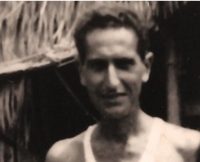The air raid alert yesterday morning — Christmas Day — took me by surprise as I was riding in a caramata [horse-drawn buggy] back from Santa Ana, where I had been to take Q.B. [Anne Balfour] some flowers. Our modest transport stops at the first wail of the sirens, followed by the blasts of police whistles. The only shelter we can find is in the arcades which line both sides of this busy street in the Sampaloc district. The shops are closed for
Christmas. In front of those that have remained open — Chinese — the shopkeepers are hurriedly bringing out wooden shutters and fastening the doors tightly. Other passers-by are gathered next to me under the arcades. We can hear the sound of the planes but the Filipinos don’t seem too concerned. A knot of people has gathered round a taxi driver who, in no uncertain terms, is accusing the driver of the caramata of having grazed the wing of his car. The planes approach and we can see them. They’re new and flying quite low in triangular formation. The
sky is overcast and they stand out distinctly against the grey cloud. Five or six shoeshine boys offer me their services as though nothing were happening. “Shoeshine, sir?” They laugh as they play with a coin on the dirty, spit-covered sidewalk. In a corner, a young Filipina is breast-feeding her child. The planes disappear into the cloud without releasing their bombs. Soon another group of nine appears. The whistle blasts have ceased
and the traffic has stopped. From time to time a military or Red Cross vehicle hurtles by. The argument between the taxi driver and the driver of the caramata is still going on. I walk on a little under the arcades. An elderly white woman, visibly nervous, speaks to me in Spanish. Seeing that I don’t understand, she asks me in English if the planes are American or Japanese. I reply cautiously that I think they’re Japanese. In fact, I’m sure of it — although the anti-aircraft guns stay silent despite the low altitude of the targets. The alert continues and the planes, always in groups of nine, reappear briefly from time to time; so I go into a bar from which loud laughter, punctuated by singing and talking, has been coming since the start of the alert. At a table in the back I discover the source of this racket, an elderly American with red cheeks and a vacant look — and a Negro type, both of them drinking beer after beer. The Negro is rambling away incoherently whilst the American, seeing me enter and in a moment of lucidity, looks embarrassed and tries to silence his noisy companion. I sit at the bar. A little later, the American staggers up to me, gives me a prolonged handshake and, despite my protests, insists on buying me a beer. Making a comic effort to pull himself together and find his words, he ends up by asking me if I’m English. His head drooping from side to side, he closes his eyes for several moments and then opens them when I tell
him I’m French. He appears to consider this for a long time before he finally mutters, “Saigon. Yes, Saigon.” At that moment the all clear sounds. I hurriedly thank my host and jump into a taxi to return to the hotel.
